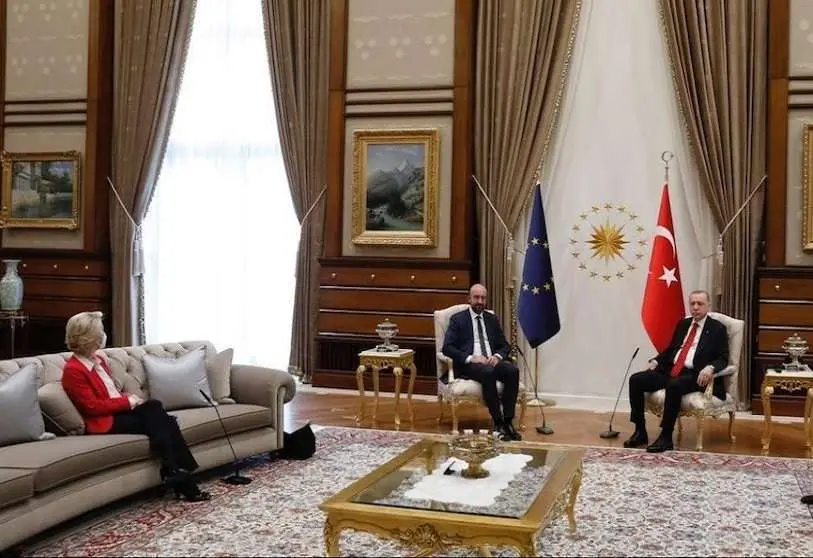“SofaGate”: No chair for Von der Leyen

The treatment of EU Commission President Ursula von der Leyen during her visit to Turkey is also an embarrassment for European Council head, Charles Michel.
A joke photo of the high-level meeting in Ankara quickly made the rounds among EU officials on social networks. The photomontage shows Turkey’s President Recep Tayyip Erdogan with EU Council President Charles Michel on their ceremonial chairs with Turkish and European flags. In front of them, EU Commission President Ursula von der Leyen is shown performing a traditional Oriental belly dance.
“SofaGate” was the name given to the ill-fated meeting. Only Michel was offered a chair next to the Turkish president. Von der Leyen noticed the provocation, but after a moment’s astonishment sat down with a loud “Ummm” on a sofa placed at a respectful distance from the distinguished gentlemen, opposite Turkey’s Foreign Minister Mevlut Cavusoglu, who later rejected the massive criticism of von der Leyen’s disparagement.
The EU representation in Ankara had requested the seating arrangement, the Turks have claimed.
But the head of the EU delegation in Ankara is the experienced German top diplomat Nikolaus Meyer-Landrut, who previously served for many years as Germany’s EU ambassador in Brussels and would probably not have accepted such a snub. A commission spokesman stressed that von der Leyen should have been seated on an equal footing in terms of protocol “just like the president of the European Council and the Turkish president”.
Italy’s Prime Minister Mario Draghi indignantly called Erdogan a dictator with bad manners. Austria’s Foreign Minister Alexander Schallenberg warned against “naivety” in relations with Turkey. “All too often, Ankara has already bitterly disappointed expectations in terms of a lasting improvement. What we need is a realistic and pragmatic approach to Turkey, not blind advance payments by the EU,” Schallenberg said.
Even if von der Leyen’s predecessor, Jean-Claude Juncker, declared that he had often sat on a sofa at such meetings “as the EU’s number two” – the seating arrangement at such formal meetings is often deliberately used by hosts as a diplomatic weapon. Similar protocol incidents had already made the headlines several times in the past.
Among other things, there had been massive criticism in Turkey when the Turkish ambassador to Israel was placed on a sofa in 2010 that was significantly lower than the chair of the then deputy foreign minister Danny Ayalon.
Russian President Vladimir Putin brought his dog to a meeting with Angela Merkel in 2007 – who is widely known to be afraid of dogs.
In 2000, Austria’s Chancellor Wolfgang Schüssel, against whose government his 14 EU colleagues had imposed sanctions at the time because of his coalition with the right-wing populist party FPÖ, had been put on a kind of “cat’s table” at the EU summit in Lisbon.
Michel, the current EU Council President, is also partly to blame for the scandal. According to the German newspaper Handelsblatt, Michel had his own chief of protocol with him, who had gone through the seating arrangements with the hosts and raised no objections. Thus, the delegation of the European Commission had already been positioned worse than Michel’s team in the reception room and at lunch.
Of course, Michel, as a gentleman, could have offered von der Leyen his chair and sat down on the sofa himself. That would also have been an elegant gesture towards Erdogan, who previously denounced and later withdrew Turkey from the UN Convention on the Prevention of Violence against Women.
The best reaction to diplomatic pushback that have I experienced was when I accompanied the then-EU Commissioner for External Relations, Benita Ferrero-Waldner, on her visit to Israel and the Palestinian Territories in 2005. In Ramallah, she wanted to talk to Palestinian President Mahmoud Abbas, but at the same time the then-French Foreign Minister, Michel Barnier, was there. The Palestinian Authority ranked the Frenchman higher than the EU representative, although the EU Commission was the largest donor to the Palestinian Authority.
They wanted to fob off the former Austrian foreign minister with the PLO foreign representative. But the former UN protocol chief (under Boutros Boutros-Ghali) noticed the disadvantage and defended herself vigorously. She resolutely entered the dining room where the PLO leadership under Abbas was having a working lunch with Barnier.
The unsettled Barnier offered Ferrero-Waldner a seat at the table, but Ferrero waved him off, saying she had to return to Israel for important meetings. But first, she had to confer with Abbas. She spoke and resolutely led Abbas by the hand out of the hall to his office where she spoke with him for an hour. I will never forget the stunned look on Barnier’s face as his host was abducted.
Otmar Lahodynsky. NewEurope

